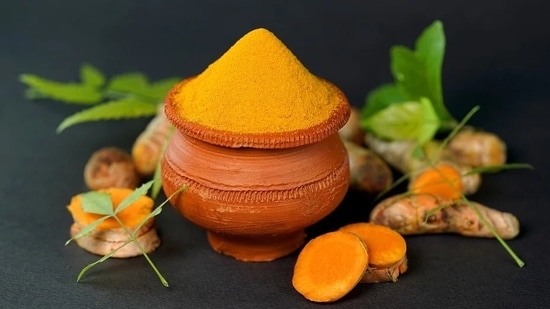
TOO MUCH TURMERIC CAN BE TOXIC; AYURVEDA EXPERT ON CORRECT WAY OF CONSUMING HALDI
A sprinkle of turmeric not only adds a vibrant hue to your delicacies, but also elevates their nutritional content and benefits. The ancient Indian spice no wonder has been trusted by Ayurveda since thousands of years and is part of many medicinal formulations. Most of its benefits can be attributed to curcumin that can do wonders for your health from improving insulin sensitivity, preventing inflammation and infections, cancer, UTI, easing digestive issues, skin issues to relieving aches and pains. It is no surprise that turmeric latte and turmeric shots are often mentioned in the list of trending superfoods and are touted to magically transform health. However, moderation is the key when consuming turmeric, like all good things, as the excess of it can have disastrous implications. (Also read | Ancient Wisdom Part 23: 5 ancient spices for weight loss; how to add them to your diet)
Ayurveda doctor Dr Zeel Gandhi in an interview with HT Digital cautions about consuming turmeric extract in large quantities as it can become potentially toxic.
"The turmeric extract, which contains purified curcumin and other alkaloids should be taken with caution. Extracted bio-chemicals can be potentially toxic if taken in high doses. Raw turmeric when consumed with its entire spectrum of phytochemicals is rarely toxic, when taken not beyond 5 - 10 gm daily. Many Nutraceutical companies lure the buyer by adding big numbers of curcumin on the label. However, a higher number does not always equate to better efficacy," says the Ayurveda doctor.
Dr Zeel says that beyond a certain limit, the body simply rejects turmeric and it can become potentially toxic. She says it's always wise to use raw organic turmeric, instead of extracts unless taken under proper guidance.
What makes turmeric so popular
"Turmeric or Haldi has long been recognised for its anti-inflammatory properties that can purify blood and boost immunity. Consuming turmeric regularly can prevent obesity as curcumin, a powerful compound in it, can control inflammation which is often a cause of weight gain. Turmeric, a staple in Indian Ayurvedic medicine, was used for its anti-inflammatory properties. Curcumin, the active compound in turmeric, can aid in weight loss by reducing inflammation and improving insulin sensitivity. It also supports fat breakdown," says Dietitian Vidhi Chawla.
It is important to consume turmeric not only in the right amount but also right quantity. Also, the golden spice isn't suitable for everyone and people with pitta disorders and even diabetes should be careful in consuming it.
"Turmeric is a hot-warming spice. Caution should be exercised in Pitta disorders like bleeding diseases, and menorrhagia. The doses of extracts or curcumin should be reduced in the hotter months of the year, and people residing in regions that experience harsh summers should always use it cautiously in summer. Pitta Prakriti individuals who have naturally warm disposition should not use it in excess," says Dr Zeel.
Nutritionist Avantii Deshpaande in an Instagram post had shared that one should choose turmeric with deep yellow colour for getting high curcumin. Such turmeric has 7% curcumin instead of 3%, which is better for health.
Turmeric for weight loss
Turmeric can be an effective remedy for shedding kilos, but those who are already underweight, always constipated or have dry skin should avoid consuming it or combine it with healthy fats.
"It is Lekhaniya, which roughly translates to scarping-of-Kapha in the body. This makes it an excellent addition to your weight loss attempts. But for individuals who are underweight, who suffer from extreme body dryness, constipation, dry and rough skin, and hair should use it sparingly and if advised always with a healthy dose of fat (ghee), or full-fat A2 cow milk," says Dr Zeel.
Why turmeric should be combined with ghee and milk
"Turmeric’s hot property is countered with ghee or milk (they are cooling). It is thus widespread to see turmeric administered in traditional ayurvedic formulations like Haridra khanda paak with milk and ghee. Turmeric and milk make a natural pair. Adding ghee and black pepper to this warm beverage potentiates its absorption and bio-availability," says the expert.
Caution with diabetes
Dr Zeel says that though turmeric is prescribed in diabetes or prameha, for individuals who take blood sugar-lowering medication, the dose needs to be adjusted if you have supplemented with curcumin lest the blood sugar levels may dip significantly.
Read more news like this on HindustanTimes.com
2024-01-11T08:30:26Z dg43tfdfdgfd